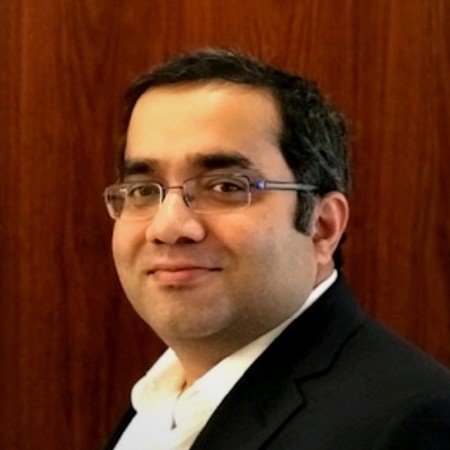Rohit lives in Newton with his wife Sanskriti and their two daughters.
His interests are reading science fiction, grilling, and watching
stand-up comedy. Way back, in his graduate student days, Rohit used to
Could you tell us a little about Tech Square Trading?
Tech Square Trading is a startup focused on making investment decisions solely using computational and statistical methods. Like most asset management firms, our business model is to invest money entrusted to us by our clients. We aim to provide them with superior returns and receive fees in return.
To differentiate ourselves, we focus on a specific niche: taking short-term positions in stocks, with roughly equal positive and negative exposures across our overall portfolio. This allows us to benefit from moves in individual stocks, without a significant exposure to broad market moves.
Your Phd was in Computational Biology. What motivated you to move to trading?
The field of computational biology is a great training ground for working with data, especially data that is messy and where each piece of it only gives you partial view of the underlying system. For instance, you might have some genomic sequence information, some gene expression data, and a bit of protein-interaction data. None of those are sufficiently informative by themselves, but they together can give you a great understanding of what's happening in the cell.
This skill of synthesizing insights translates very well to many other domains. Specifically, in quantitative investing you also try to discern a signal from multiple noisy datasets (e.g. stock prices, news data, satellite data.). Additionally, a big attraction of trading for me has always been that the think-code-test cycle in quantitative trading is much shorter than in most other fields. Moreover, you directly get a response (from the market) if your ideas work. When they do, it's a great feeling!
You were admitted to IIT Kanpur and AIIMS. What motivated you to choose computer science over medicine?
In hindsight, this was more serendipity than anything else. My older brother had graduated from IIT Kanpur Computer Science, so that was definitely a factor. Also, I remember thinking that studying medicine (MBBS, then MD) takes a long time. Having just finished slogging for the entrance exams, it seemed very tempting that at IIT I'd be done in just four years. Little did I foresee my future multi-year journey as a Masters and then PhD student!
Data Science has been a very important field now. Could you outline interesting problems in this space that people want to look into?
The tools of data science have become so good and easy-to-use now that most people could benefit from taking a data-oriented view in their work. I think people often underestimate the power of analyzing a huge collection of data, even when each data point in isolation seems laughably inadequate. In terms of opportunities, I think a great impact can be made on bottom-of-the-pyramid problems: can you cheaply collect and/or analyze data to help improve the health, education or life-quality of a person living on under $2 per day?
What skills are needed to succeed in quantitative trading?
Strong mathematical and statistical sophistication is a must, as is a decent ability to code. The more effectively you can code, the better. Prior knowledge of finance is actually not that important-- most people are taught that on the job. But a tinkering, iterative-improvement mindset, along with the discipline to follow good research habits, goes a long way.
What is your vision for Tech Square Trading?
I would love for Tech Square Trading to become one of the most respected quant firms in the business. I don't necessarily want us to be the biggest, but I want us to provide our investors exceptional returns, be a responsible market participant, and a fantastic and coveted place to work.
What are the opportunities in the field of quantitative trading?
Investing is getting ever more systematized and quantitative. This is enabling a rich set of opportunities for an aspiring quant. As a new quant, you can focus on asset classes as avant-garde as Bitcoin or as old school as US government bonds. There are opportunities in system-building, in statistical modeling, and in innovative data collection, to name just a few.
How did your undergraduate at IIT help shape your career?
My education at IIT was foundational for everything that followed. Every day in my job, I still use the skills and knowledge I learned there. IIT also taught me how to work hard and to persevere. Most importantly, I made great friends who have cheered, counseled and consoled me over the ups and downs in life since then. They remain my closest friends.
Thank you for your time
Thank you

